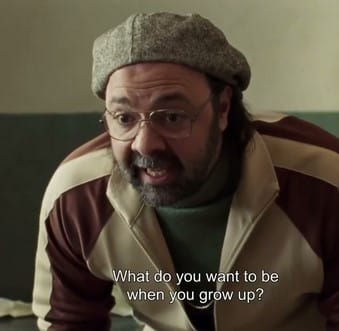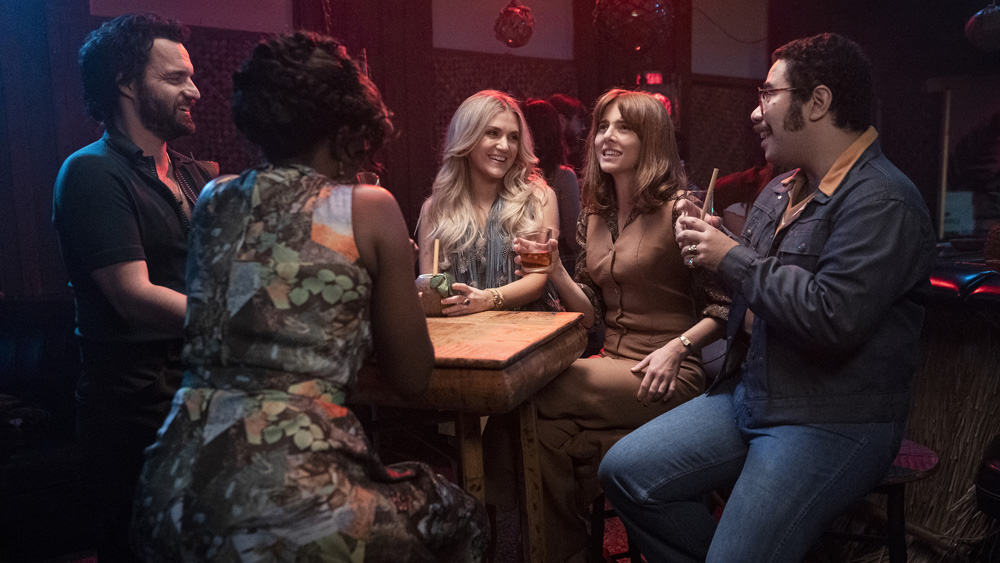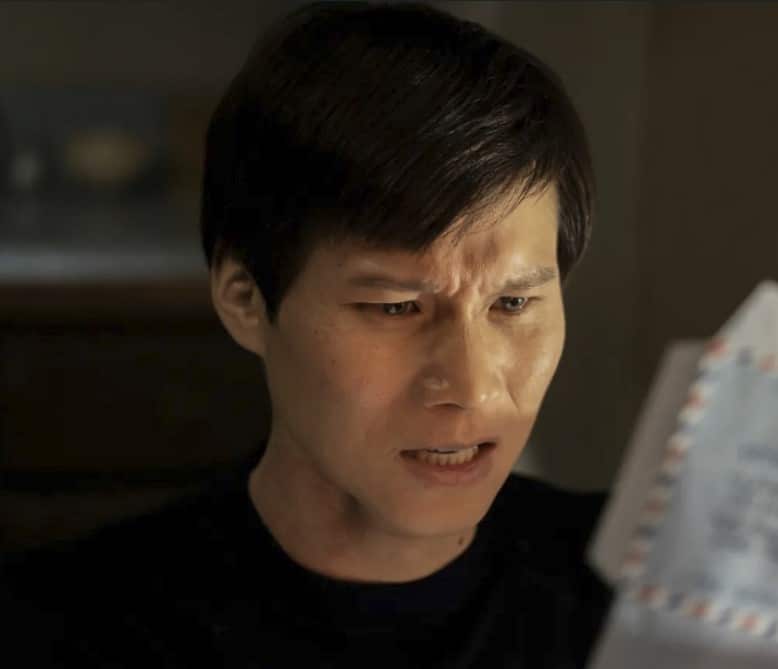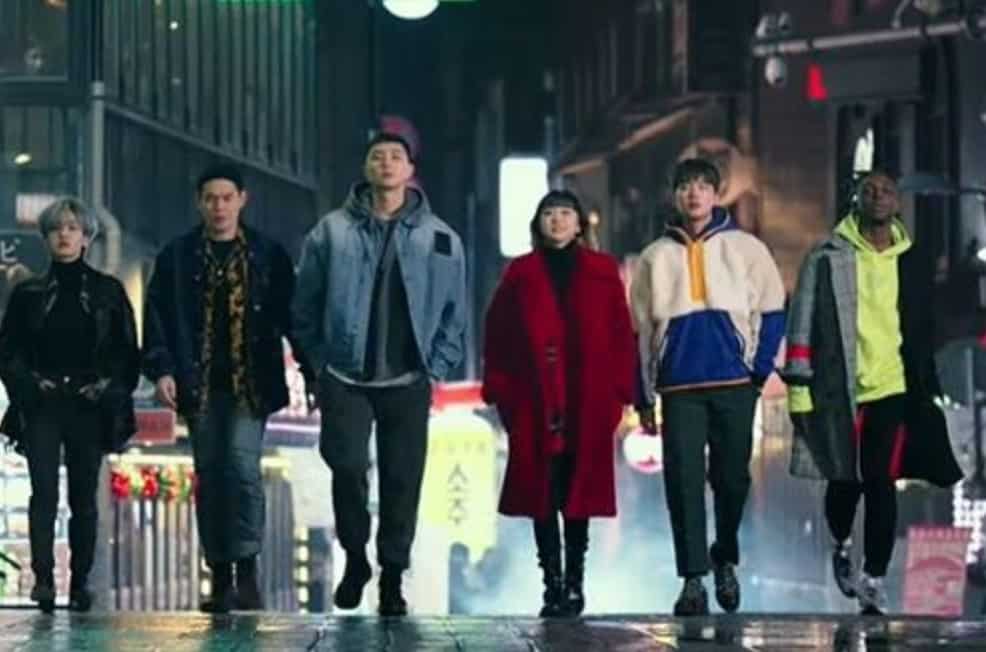Watercooler Pick
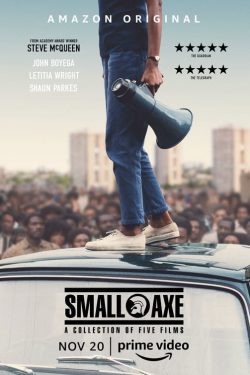
Small Axe
- Series
- Where to Find It: Prime Video
- Rating: TV-MA
- Release Date: 2020
- Seasons: 1
- Episodes : 5
- Length: 60 minutes to 2 hours
Recommended by:
Share on social media
Find More Watercooler Picks
Small Axe is a Golden Globe nominated film anthology series of historical dramas that tell the long-overlooked stories of London’s West Indian community from the 1960s through the 1980s.
Letitia Wright, John Boyega, Shaun Parkes, Malachi Kirby, Sam Spruell. Directed by Steve McQueen. Written by McQueen, Alastair Siddons, and Courttia Newland.
The history and stories from this part of London, of England, really hasn’t been told before. It’s a revelation, and in many ways, heartbreaking. The title comes from an African proverb, “If you are the big tree, we are the small axe.” Removing large obstacles, in other words, requires many small actions.
It’s a mighty big tree with heavy branches, and it really wasn’t until the last film, “Education,” when I fully understood the points McQueen is making. But, fair warning, the anthology might start to feel like oppression porn before you get there. I mean, I learned a couple of new racial slurs, and that can’t be good.
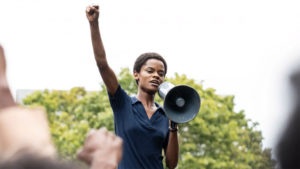 The first film, “Mangrove,” tells the true story of the Mangrove restaurant in Notting Hill and the trial of the Mangrove 9 in 1971. The Mangrove was a carribean restaurant owned by Frank Critchlow, played by Shaun Parkes (The Mummy Returns). Since its opening in the late 60s, it was under constant, constant harassment by the local police and officials. The restaurant was raided practically every week, patrons were arrested, and the owner’s food and alcohol permits revoked. Meanwhile, police were pulling young Black men off the street, beating and jailing them for no reason. As Powell, the local precinct captain (Sam Spruell) sneers, Blacks need to be kept in their “place.”
The first film, “Mangrove,” tells the true story of the Mangrove restaurant in Notting Hill and the trial of the Mangrove 9 in 1971. The Mangrove was a carribean restaurant owned by Frank Critchlow, played by Shaun Parkes (The Mummy Returns). Since its opening in the late 60s, it was under constant, constant harassment by the local police and officials. The restaurant was raided practically every week, patrons were arrested, and the owner’s food and alcohol permits revoked. Meanwhile, police were pulling young Black men off the street, beating and jailing them for no reason. As Powell, the local precinct captain (Sam Spruell) sneers, Blacks need to be kept in their “place.”
The neighborhood rallies around the restaurant, holding a protest march to the local police station, which Frank reluctantly takes part in. He and eight other protesters, including activist Darcus Howe, played by Malachi Kirby (Roots) and Black Panther organizer Altheia Jones-LeCointe, played by Letitia Wright (Black Panther) are arrested and tried for instigating a riot. They were eventually acquitted, but the restaurant continued to be periodically raided until Critchlow closed it in 1992 … 21 years later.
I’d never heard of the Mangrove before and the only thing I knew about Notting Hill was the chic, bohemian, and apparently white-washed world of the Hugh Grant film. It never occurred to me that 1970s London could look and feel so much like 1950s Birmingham. Black people pulled over for no reason, other than that they “fit a description.” Racist graffiti. Smug and sneering cops. The hats are fancier, but other than that, not much difference. Blacks in England had to deal with this stupid Jim Crow crap, too? It’s disappointing and infuriating.
 As if to say, “It wasn’t all bad!” the next film, “Lovers Rock,” throws us into a house party in the neighborhood. Music, dancing, and young love abound. Also excessive drinking, hurt feelings, and sexual assault—all universally familiar to any teenager who’s snuck out of their house on a Saturday night.
As if to say, “It wasn’t all bad!” the next film, “Lovers Rock,” throws us into a house party in the neighborhood. Music, dancing, and young love abound. Also excessive drinking, hurt feelings, and sexual assault—all universally familiar to any teenager who’s snuck out of their house on a Saturday night.
The third film, “Red, White and Blue” pulls us back to harsh reality in the 80s. John Boyega (Star Wars: Episodes 7-9) portrays real-life constable Leroy Logan. Logan, who earned a PhD in chemistry, fulfills his life-long dream to join the force after his father, Kenneth, is viciously beaten by the police. Leroy’s reasoning is that he can work to make changes from the inside.
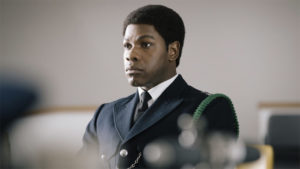 Kenneth, played by Steve Touissant, is predictably furious, and his friends are bewildered by the choice. Leroy quickly discovers that things on the inside are worse than he thought, as he faces a community that no longer trusts him and racism from his fellow officers. His locker is vandalized with racial slurs. They abandon him in dangerous situations. He’s prevented from rising in the ranks. But when he’s finally ready to quit, it’s his father, of all people, who convinces him to hang in there. “The world move [sic] forward,” Kenneth says, “Always do. But the world? That is a slow-moving wheel.”
Kenneth, played by Steve Touissant, is predictably furious, and his friends are bewildered by the choice. Leroy quickly discovers that things on the inside are worse than he thought, as he faces a community that no longer trusts him and racism from his fellow officers. His locker is vandalized with racial slurs. They abandon him in dangerous situations. He’s prevented from rising in the ranks. But when he’s finally ready to quit, it’s his father, of all people, who convinces him to hang in there. “The world move [sic] forward,” Kenneth says, “Always do. But the world? That is a slow-moving wheel.”
The fourth film, “Alex Wheatle,” is based on the true story of the Young Adult novelist, who we meet on his first day in prison in 1981. Wheatle grew up in foster homes and orphanages, where he was predictably mistreated. After aging out of the system, Alex (Sheyi Cole) goes to London. His roommate Dennis (Johnathan Jules) takes Alex under his wing and introduces him to the Afro-carribean neighborhood, where Alex flourishes.
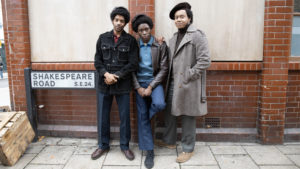 He adopts the dialect. He spins records at house parties. He jabs in and out with a sketchy crowd. He identifies with his new home and friends so much that he gets arrested for participating in the Brixton Riot in 1981. The riot (or uprising, depending on who you ask) was the aftermath of an apartment firebombing which killed 13 Black people. What is the point—Alex asks his cellmate Simeon—in trying to change things when all it does is land Black people in jail or on the dole? Simeon, played by Robbie Gee, tells Alex that, racism aside, the one thing he has to remember about British society is that it’s based on class and classism. Education, Simeon says, is the only way to get out of the dead-end cycle. “If you don’t know your past, then you don’t know your future.”
He adopts the dialect. He spins records at house parties. He jabs in and out with a sketchy crowd. He identifies with his new home and friends so much that he gets arrested for participating in the Brixton Riot in 1981. The riot (or uprising, depending on who you ask) was the aftermath of an apartment firebombing which killed 13 Black people. What is the point—Alex asks his cellmate Simeon—in trying to change things when all it does is land Black people in jail or on the dole? Simeon, played by Robbie Gee, tells Alex that, racism aside, the one thing he has to remember about British society is that it’s based on class and classism. Education, Simeon says, is the only way to get out of the dead-end cycle. “If you don’t know your past, then you don’t know your future.”
Everything comes together in “Education.” Meet 12-year-old Kingsley. He’s a bright science and astronomy buff, but he has trouble reading. He’s ridiculed and berated by his (white) teachers, until an incident lands him in a meeting with the headmaster and his mother. The headmaster informs Kingsley’s mother that her son has a “lower than average IQ” and because of that and his bad behavior, he’s being sent to a “special needs” school. Kingsley’s mother, Agnes (Sharlene Whyte), who has two jobs and absolutely no time for any of this, accepts this “good news” at face value, especially since the school provides a bus to take him back and forth.
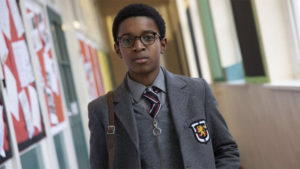 The new school, Durants, is a farce and a disaster. Teachers show up to read story books, or don’t show up at all. No curriculum, no lessons, just classrooms serving as holding rooms. Kingsley hates it, but what can he do? He complains to his sister Stephanie (Tamara Lawrance) that he’s attending a “stupid school” and Stephanie confirms from the brochure that Durants is a school for the educationally subnormal. In England, attending an ESN school brands you for life to menial labor and poverty. Class and classism and the good old school-to-prison pipeline.
The new school, Durants, is a farce and a disaster. Teachers show up to read story books, or don’t show up at all. No curriculum, no lessons, just classrooms serving as holding rooms. Kingsley hates it, but what can he do? He complains to his sister Stephanie (Tamara Lawrance) that he’s attending a “stupid school” and Stephanie confirms from the brochure that Durants is a school for the educationally subnormal. In England, attending an ESN school brands you for life to menial labor and poverty. Class and classism and the good old school-to-prison pipeline.
Kingsley’s story is autobiographical—McQueen attended a similar school at that age. Stephanie alerts her mother that the school is setting Kingston up for failure, but Agnes doesn’t listen until a local politician knocks on the door. Lydia has sent a spy disguised as a journalist to get more detail about what’s going on at Durrants, and how many West Indian children are being sent to these schools to essentially get them out of the way. After hearing horror stories from other parents, and confronting the headmaster about his lies, Agnes determines to get Kingsley back to a regular education. In the meantime, she sends to a special weekend program that provides supplemental learning on the weekends, set up by— did you guess?—the West Indian community. Small acts with small axes. It takes a village to cut down that tree.
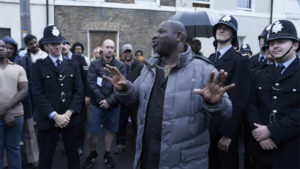 In classic McQueen style, each individual film is at least 10 minutes too long, which is saying a lot for a 60-minute run time. In some places it works, like when you’re watching a teacher kill time at Durants by singing “House of the Rising Sun” very, very badly, or in the aftermath of a Mangrove raid, where a steel bowl shakes and circles around and around until it comes to rest in the silence. In most places, though, it’s just a drag on the story. Some of the dialogue is heavy on the exposition or downright clunky. Nothing ruinous, but definitely sigh-worthy.
In classic McQueen style, each individual film is at least 10 minutes too long, which is saying a lot for a 60-minute run time. In some places it works, like when you’re watching a teacher kill time at Durants by singing “House of the Rising Sun” very, very badly, or in the aftermath of a Mangrove raid, where a steel bowl shakes and circles around and around until it comes to rest in the silence. In most places, though, it’s just a drag on the story. Some of the dialogue is heavy on the exposition or downright clunky. Nothing ruinous, but definitely sigh-worthy.
Personally, I also would have loved it if characters from different films ever ran into each other. It’s such a close=knit community, a lot of “Oh, yeah, I know your second cousin’s mother” talk, and historically speaking many of the characters were there at the same time. But it never happens, and I feel that was a missed opportunity. But at least in every story the West Indian community comes together to support each other as their government continues to fail them. They are, in the end, all they’ve got.
This anthology, as a whole, is very compelling, even if it’s not perfect. Each film ends ambiguously—progress is made, but the story isn’t over. The job is clearly not done, because 30, 40 years later we’re still faced with the same issues. Small Axe is McQueen’s love letter to the community that raised him and, you might say, saved him.
A fellow history buff. This would be a great binge watch, occasionally paused to check Wikipedia. Also a great educational watch with the kids for Black History month. Although they, too, might get a little bummed that this BS is still happening decades later.
Since the majority of these films are about real people and places, definitely hit up Google while you’re watching. There are more happy-ish endings than you’d expect. I mean, look what happened to Steve MeQueen!
- Moods: enlighten me, inspire me, take me back, transport me
- Interests: coming of age, conversation worthy, crime and punishment, history, international, politics, true stories
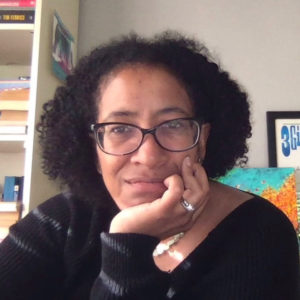
Liz Coopersmith



